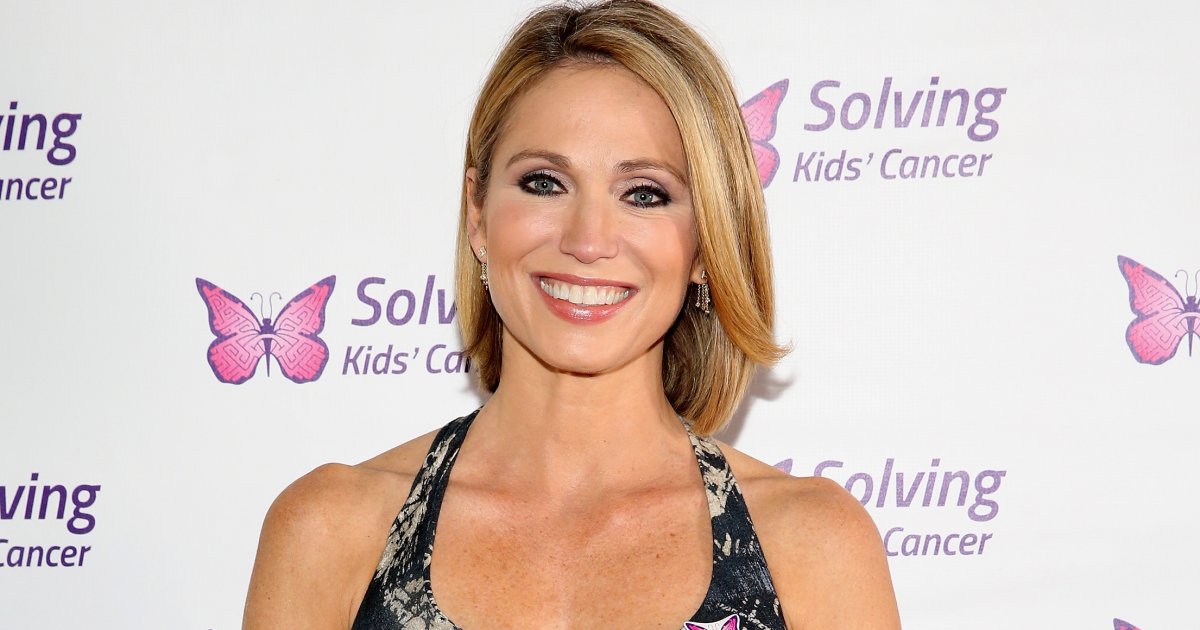Eight Years and Counting
- It has been eight years since Good Morning America’s Amy Robach was diagnosed with stage two invasive breast cancer.
- In a new Instagram post, Robach shares her gratitude for the people in her life that have helped make the years since her recovery so special, including her husband and her two best friends.
- Robach was initially diagnosed during an on-air mammogram that was part of a Good Morning America breast cancer awareness campaign. After Robach’s tumor was detected, she had a bilateral mastectomy and six months of chemotherapy.
Robach took to Instagram to celebrate her day of diagnosis and express gratitude that she leads a life full of love and powerful relationships all these years later. "I am the luckiest – 8 years and counting – and spending it with the love of my life and my 2 best friends!" she wrote.
Read MoreView this post on Instagram
Amy's Journey With Cancer
The journalist was diagnosed with stage two invasive breast cancer in 2013, and she has been in remission for the past eight years. Robach maintains a remarkably active lifestyle, and running is her favorite way to keep herself in shape, physically and mentally. She had no history of cancer in her family, and she was relatively young to be fighting this disease; Robach was 40 at the time of her diagnosis.
It was thanks to an on-air mammogram for a Good Morning America awareness campaign that revealed tumors in her breast. Following the tumor detection, Robach immediately started treatment. She had a bilateral mastectomy and six months of chemotherapy.
A mastectomy is the surgical removal of the breast. It may be the full or partial removal of one or both breasts as a way to remove cancer from that region of the body. Some women have preventative mastectomies if they're at a high risk of being diagnosed. For instance, if breast cancer runs in their family, or if they carry the BRCA1 or BRCA2 gene mutation.
When Robach agreed to get a live mammogram in front of millions of people on Good Morning America she never thought that the results would actually come back positive. The TV host admitted to SurvivorNet in a previous interview that she took the shocking news poorly and was even angry at her current husband for not reacting the way she wanted him to.
"I don't know how other people handle that news, but I didn't handle it well," Robach said. "I became an absolute wreck, a total mess. I had my husband on speaker phone at the time of diagnosis because he was 3,000 miles away … I remember the radiologist, because my husband said nothing, we were all shocked beyond belief, said into the phone, 'Mr. Shue, your wife's not taking the news very well.' …trying to get him to say something."
"I had an idea of what he should be doing, what he should be saying, what he should be feeling, and if he didn't do any of those things the way I wanted him to, or what I thought I needed, I was extra upset and extra angry."
She said they were already struggling when she got the cancer diagnosis. "So this kind of threw everything into a further tailspin, until it didn't … until we realized that we were only stronger together and that we had to give each other a break."
"My husband coined a phrase that I remind myself of everyday: 'Don't die before you die.' I have used that, instead of feeling like I'm a victim, like this happened to me, I really feel like, what can I do to make my body stronger? So for me, I've been weight lifting and running. I've taken some control back. I might not have the breasts I once had, but I've got guns I never had before."
Good Morning America anchor Amy Robach, a breast cancer survivor who has been in remission for 8 years, is appreciating staying present, and celebrating life with her friends.
Screening for Breast Cancer
Mammograms, like the one Robach had on-air, are used to detect lumps in the breast and signs of breast cancer. Current guidelines say that women aged 45 to 54 with an average risk of the disease (meaning, no family history of breast cancer) should screen once a year. Women with a family history of breast cancer should start screening earlier than 45.
In an earlier interview, Dr. Connie Lehman, the chief of Breast Imaging Division at Massachusetts General Hospital, emphasizes the importance of mammograms. She says, "If you haven't gone through menopause yet, I think it's very important that you have a mammogram every year."
"We know that cancers grow more rapidly in our younger patients, and having that annual mammogram can be lifesaving," says Dr. Lehman. "After menopause, it may be perfectly acceptable to reduce that frequency to every two years."
She continues, "But what I'm most concerned about is the women who haven't been in for a mammogram for two, three, or four years, those women that have never had a mammogram. We all agree regular screening mammography saves lives."
Women should have annual mammograms between the ages of 45 and 54. Learn more from our expert, Dr. Connie Lehman.
Learn more about SurvivorNet's rigorous medical review process.


